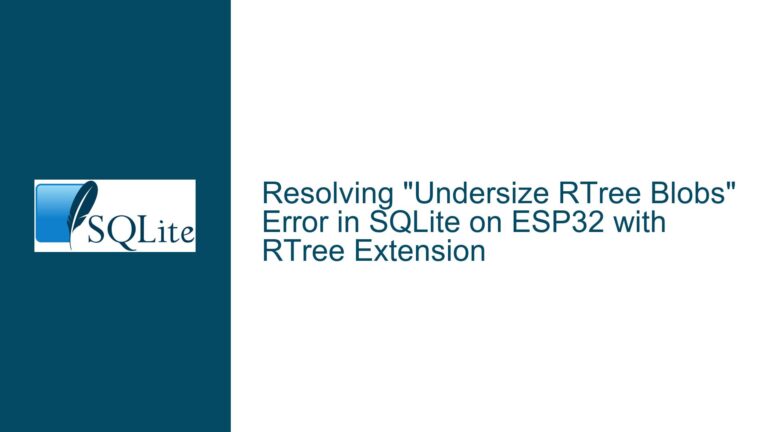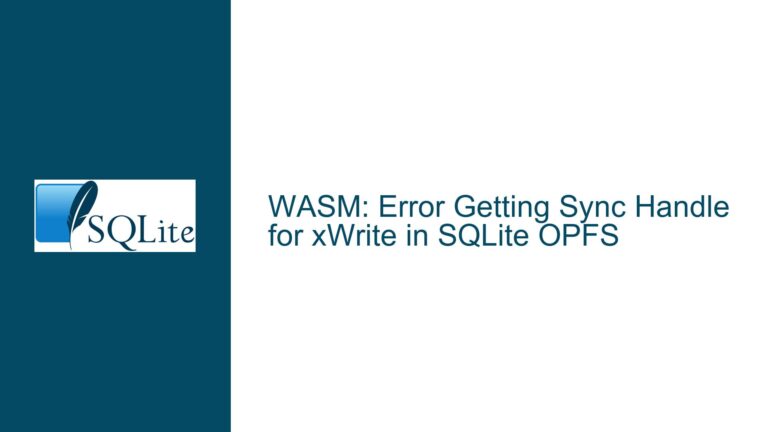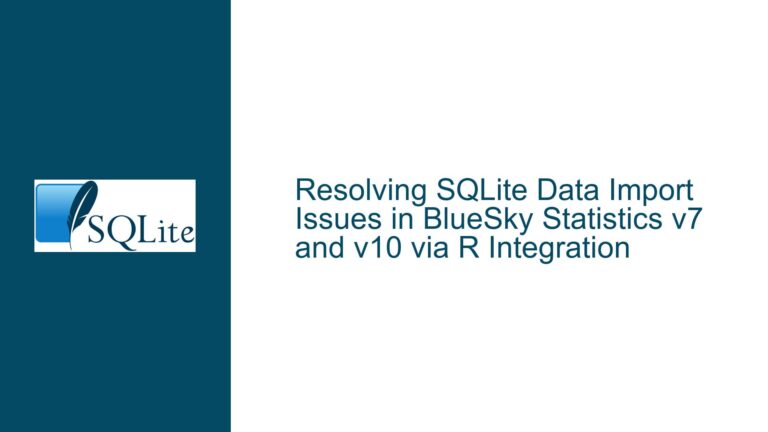Thread-Safe Retrieval of Last Insert Rowid and Changes in Multi-Threaded SQLite
Understanding Thread Contention for sqlite3_last_insert_rowid and sqlite3_changes
The Problem of Shared Connection State in Concurrent Threads
When working with SQLite in a multi-threaded environment using the default serialized threading mode, developers often encounter unexpected behavior when retrieving the number of rows affected by a query (sqlite3_changes) or the auto-incremented row ID of the last inserted row (sqlite3_last_insert_rowid). These functions rely on connection-level global state, which becomes a critical point of contention when multiple threads share the same database connection. The core issue arises when Thread A executes a statement (e.g., an INSERT or UPDATE), and before it can retrieve the result of sqlite3_last_insert_rowid or sqlite3_changes, Thread B executes another statement on the same connection, overwriting these values. This leads to data races where threads inadvertently consume stale or incorrect values, violating the integrity of application logic that depends on these metrics.
The problem is exacerbated by SQLite’s design, which prioritizes efficiency and simplicity. Connection-level state variables are not thread-local; they reflect the most recent operation on the connection, regardless of which thread performed it. While SQLite’s serialized mode ensures that internal operations are thread-safe (e.g., concurrent sqlite3_step calls are serialized), it does not extend this safety to the application-layer retrieval of post-execution metadata. Developers must therefore implement additional safeguards to ensure that thread-specific operations do not interfere with one another’s connection state.
Root Causes of Non-Deterministic Behavior in Shared Connections
1. Connection-Level State Variables Are Not Thread-Local
SQLite’s sqlite3_last_insert_rowid and sqlite3_changes are stored as properties of the sqlite3 connection object. These values are updated immediately after a statement execution (e.g., INSERT, UPDATE, DELETE) and are not isolated to the thread that executed the operation. In a multi-threaded context, this creates a classic "last writer wins" scenario, where the values returned by these functions depend on the timing of thread execution. For example:
- Thread 1: Inserts a row into
table_a, generating a rowid of 42. - Thread 2: Updates
table_b, affecting 5 rows. - Thread 1: Calls
sqlite3_last_insert_rowid(db), expecting 42, but receives the rowid from Thread 2’s operation (if any).
This behavior is not a bug but a documented limitation. SQLite’s threading guarantees focus on preventing internal corruption, not on preserving application-level invariants across threads sharing a connection.
2. Improper Synchronization of Statement Execution and Metadata Retrieval
Even when threads use mutexes or other locking mechanisms to coordinate access to the database connection, a common pitfall is failing to wrap both the statement execution and the subsequent metadata retrieval within a critical section. For instance:
// Thread A
sqlite3_mutex_enter(mutex);
sqlite3_step(stmt);
// Assume no other thread interrupts here
int changes = sqlite3_changes(db); // Safe?
sqlite3_mutex_leave(mutex);
If Thread B acquires the mutex immediately after Thread A releases it but before sqlite3_changes is called, Thread B’s operations could overwrite the changes value. This race condition arises because the mutex protects the execution of sqlite3_step but not the subsequent retrieval of connection state. Proper synchronization requires that the entire sequence—preparation, binding, stepping, and metadata access—be atomic.
3. Over-Reliance on Serialized Mode Without Understanding Its Scope
Serialized threading mode allows multiple threads to safely use the same connection by serializing access to internal SQLite structures. However, this does not equate to thread-local storage for connection state. Developers often misinterpret serialized mode as a blanket guarantee that all operations on a shared connection will behave as if they were single-threaded. In reality, serialized mode prevents data corruption but does not isolate thread-specific metadata. For example, two threads alternating INSERT operations will see each other’s last_insert_rowid, which may not align with application expectations.
4. Statement Reuse Across Threads Without Reset
Prepared statements (sqlite3_stmt) are often reused across multiple executions to amortize preparation costs. However, when statements are shared between threads, the act of resetting or rebinding a statement in one thread can interfere with another thread’s in-progress operation. For instance:
- Thread 1: Binds parameters to
stmt, executes it, and begins processing results. - Thread 2: Resets
stmt, binds new parameters, and executes it. - Thread 1: Attempts to retrieve
sqlite3_changesbut gets the value from Thread 2’s execution.
This highlights the need for thread-local statement handles or strict ownership protocols.
Strategies for Safe Retrieval of Rowid and Changes in Multi-Threaded Contexts
1. Use Dedicated Database Connections Per Thread
The simplest and most reliable solution is to avoid sharing a single database connection across threads. Instead, each thread should open its own connection to the database. This eliminates contention for connection-level state variables entirely, as each thread operates on isolated state.
Implementation Steps:
- Initialize a Connection Pool: At application startup, create a pool of database connections (one per thread or using a dynamic pool based on demand).
- Assign Connections to Threads: When a thread begins work, it checks out a connection from the pool, ensuring exclusive access.
- Return Connections After Use: After completing its task, the thread returns the connection to the pool for reuse.
Advantages:
- No contention for
last_insert_rowidorchanges, as each thread’s connection is independent. - Simplifies transaction management, as transactions are scoped to a single thread’s connection.
Drawbacks:
- Increased memory usage due to multiple open connections.
- Potential for increased I/O overhead if connections are not efficiently reused.
Example Code (C++ with connection pooling):
// Global connection pool
std::vector<sqlite3*> connection_pool;
std::mutex pool_mutex;
sqlite3* get_connection() {
std::lock_guard<std::mutex> lock(pool_mutex);
if (connection_pool.empty()) {
sqlite3* db;
sqlite3_open("database.db", &db);
return db;
}
sqlite3* db = connection_pool.back();
connection_pool.pop_back();
return db;
}
void return_connection(sqlite3* db) {
std::lock_guard<std::mutex> lock(pool_mutex);
connection_pool.push_back(db);
}
// Worker thread
void thread_work() {
sqlite3* db = get_connection();
// Execute queries using db...
return_connection(db);
}
2. Leverage the RETURNING Clause for Deterministic Results
SQLite 3.35.0+ introduced the RETURNING clause, which allows queries to return data from modified rows. This feature can replace reliance on sqlite3_changes and sqlite3_last_insert_rowid by directly embedding the required information in the query result.
Use Cases:
- Inserting Rows: Retrieve the auto-generated rowid directly.
INSERT INTO users (name) VALUES ('Alice') RETURNING rowid; - Updating Rows: Obtain the number of affected rows or specific column values.
UPDATE orders SET status = 'shipped' WHERE customer_id = 42 RETURNING COUNT(*);
Implementation Steps:
- Modify Queries to Include RETURNING: Adjust
INSERT,UPDATE, andDELETEstatements to return the necessary data. - Process Results in Application Code: Use
sqlite3_stepand column access functions to extract returned values.
Advantages:
- Eliminates race conditions by tying results directly to the executed statement.
- Reduces reliance on global connection state.
Drawbacks:
- Requires SQLite 3.35.0 or newer.
- Slight overhead for parsing additional result data.
Example Code:
sqlite3_stmt* stmt;
sqlite3_prepare_v2(db, "INSERT INTO users (name) VALUES (?) RETURNING rowid", -1, &stmt, 0);
sqlite3_bind_text(stmt, 1, "Alice", -1, SQLITE_TRANSIENT);
if (sqlite3_step(stmt) == SQLITE_ROW) {
int64_t rowid = sqlite3_column_int64(stmt, 0);
// Use rowid immediately...
}
sqlite3_finalize(stmt);
3. Enforce Strict Mutex Guarding Around Critical Sections
When sharing a connection is unavoidable, use mutexes to ensure that the sequence of statement execution and metadata retrieval is atomic. This requires wrapping all operations—preparation, binding, stepping, and metadata access—within a mutex-protected block.
Implementation Steps:
- Acquire a Mutex Before Database Operations: Use
sqlite3_db_mutex(db)to obtain the connection-specific mutex. - Execute Statement and Retrieve Metadata Atomically:
sqlite3_mutex_enter(sqlite3_db_mutex(db)); sqlite3_bind_int(stmt, 1, 42); sqlite3_step(stmt); int changes = sqlite3_changes(db); int64_t rowid = sqlite3_last_insert_rowid(db); sqlite3_reset(stmt); sqlite3_mutex_leave(sqlite3_db_mutex(db)); - Avoid Long-Running Operations Inside Critical Sections: Ensure that business logic outside SQLite operations does not reside within the mutex-guarded block to minimize contention.
Advantages:
- Allows safe sharing of a connection when properly implemented.
- Integrates with SQLite’s internal mutex system.
Drawbacks:
- Increases latency due to mutex contention.
- Risk of deadlocks if mutexes are held across external I/O operations.
Pitfall to Avoid:
- Nested Mutex Acquisition: If a thread re-enters a critical section while already holding the mutex, it may deadlock. Use recursive mutexes if necessary.
4. Implement Thread-Local Storage for Connection State
For advanced use cases, consider extending SQLite with custom functions that store last_insert_rowid and changes in thread-local storage (TLS). This approach involves intercepting SQLite operations and caching the results per-thread.
Implementation Steps:
- Define Thread-Local Variables:
#include <threads.h> thread_local int tls_changes = 0; thread_local int64_t tls_last_rowid = 0; - Hook into SQLite Operations: Use SQLite’s update hook or authorizer callback to capture changes and rowid:
void update_hook(void* arg, int opcode, char const* dbname, char const* tblname, sqlite3_int64 rowid) { tls_last_rowid = rowid; tls_changes++; // Simplified; actual logic depends on operation type } sqlite3_update_hook(db, update_hook, NULL); - Expose Custom API Functions:
int my_sqlite3_thread_changes() { return tls_changes; } int64_t my_sqlite3_thread_last_rowid() { return tls_last_rowid; }
Advantages:
- Transparently provides thread-local metadata.
- No changes required to existing SQLite queries.
Drawbacks:
- Relies on non-standard SQLite extensions.
- May not capture all edge cases (e.g., triggers, foreign key actions).
5. Adopt a "Prepare-Execute-Finalize" Per-Thread Workflow
To avoid reusing statements across threads, restructure code to prepare, execute, and finalize statements within the same thread context. This ensures that statement-associated metadata (if stored) remains thread-local.
Implementation Steps:
- Avoid Global or Shared Statement Handles: Prepare statements within each thread and finalize them before the thread exits.
- Use Thread-Specific Caches for Prepared Statements: If statement reuse is necessary, maintain a cache of prepared statements per thread.
Example Code:
// Thread-local statement cache
thread_local std::unordered_map<std::string, sqlite3_stmt*> stmt_cache;
sqlite3_stmt* get_cached_stmt(sqlite3* db, const char* sql) {
auto& cache = stmt_cache;
auto it = cache.find(sql);
if (it != cache.end()) {
return it->second;
}
sqlite3_stmt* stmt;
sqlite3_prepare_v2(db, sql, -1, &stmt, nullptr);
cache[sql] = stmt;
return stmt;
}
void thread_work(sqlite3* db) {
sqlite3_stmt* stmt = get_cached_stmt(db, "INSERT INTO logs (message) VALUES (?)");
sqlite3_bind_text(stmt, 1, "Thread-specific log", -1, SQLITE_TRANSIENT);
sqlite3_step(stmt);
int64_t rowid = sqlite3_last_insert_rowid(db); // Safe if other threads use their own stmt caches
sqlite3_reset(stmt);
}
Advantages:
- Minimizes statement preparation overhead while keeping metadata thread-local.
- Compatible with existing SQLite APIs.
Drawbacks:
- Increased memory usage due to per-thread statement caches.
- Requires careful management of statement lifetimes.
Conclusion: Choosing the Right Strategy for Your Application
The optimal approach depends on your application’s specific requirements and constraints. For most use cases, using separate connections per thread provides the simplest and most robust solution. When connection pooling is impractical, strict mutex guarding or the RETURNING clause offer viable alternatives. Advanced users may explore thread-local storage hooks or statement caching, but these require deep integration with SQLite’s internals and careful testing. By understanding the nuances of SQLite’s threading model and connection state management, developers can mitigate race conditions and ensure reliable access to last_insert_rowid and changes in multi-threaded environments.






